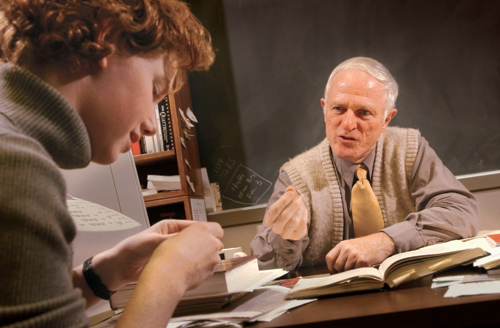“What is knowledge? And what does it mean to know something?” asks Ralph Slaght, Hogg Professor of Mental and Moral Philosophy. “It is difficult to define the concept. Most people say they know something, but it’s really a belief.” Students in his Philosophical Analysis course write a paper a week, learning to read an article or book critically, extract and evaluate the key arguments, and write cogent comments. “Often there are inconsistent beliefs” in an article, he says, asking the students, “Can you prove the validity of the argument?” These critical thinking and evaluation skills are useful in any discipline.
Slaght studies philosophical questions such as the difference between knowledge and belief. An early adopter of technology, he taught himself computer programming. “I was teaching logic when I learned of a computer program to help students,” says Slaght. “I got a copy of the program, which was too advanced to run on Lafayette’s computer at the time. I thought, ‘I can learn this stuff,’ and taught myself programming.” When Lafayette President David Ellis wanted to increase the use of computers in the humanities, he asked Slaght to help. “He was essentially paying me to learn to do something I’d enjoy anyway,” says Slaght, who went on to direct the academic computing center for a year while a search was underway for a permanent director. He was also one of three faculty who developed the proposal to create a computer science major, which was controversial at that time.
Slaght has been very active on faculty governance committees, and served as clerk of the faculty for 14 years. “As clerk you are also an associate member of the Board of Trustees,” he says. “You have no vote, but are a voice to share faculty opinions with the board, and serve as an information conduit among the board, the president, and the faculty.”
A math major in college, Slaght switched to philosophy for his doctorate. Both disciplines use the same logical thinking skills that he now teaches students to evaluate arguments.
Slaght came to Lafayette in 1969. He also had a job offer from Susquehanna University, but says, “When I arrived at this place, I could see where I’d end my career. I felt Lafayette was the better school. It’s a quality liberal arts college. I started at the top. Why would I leave?” Among the highlights of his time at Lafayette is meeting his wife, Susan Bauman ’74. They have been married 29 years.
“Ralph exemplifies the faculty’s involvement with students,” says Thomas Andress ’76, partner, ABD Engineers and Surveyors, Schenectady, N.Y., and a member of Lafayette’s outing club with Slaght. “He provided transportation in his new car for outing club events, such as the caving trip in which we initiated surprised new members who didn’t realize caving involved crawling and sliding through 50-degree muddy caves. After not seeing Ralph for 20 years, on a visit with my son I stopped in to say hello. Without hesitation Ralph said, ‘A familiar faceTom Andress.’ My son was quite impressed, enough so that he may become the fourth generation Andress at Lafayette.”
“Ralph introduced me to the world of winter mountaineering in New Hampshire’s White Mountains,” says Jeffrey Shreiner ’72, biologist, Delaware Water Gap National Recreation Area, and former outing club president. “What great memories! One year, he led us up Mt. Washington in white-out conditions and 50 mph winds. We followed rock cairns and relied on Ralph’s superb navigational skills. I recall being picked up and carried for some distance, then plopped down on the wind-packed snow by what must have been a 100 mph gust.” Another time Slaght was driving the group to the Grand Canyon of Pennsylvania. “We left Lafayette right after classes had ended for the spring semester and headed for the Canyon, Ralph behind the wheel. Late that night, we got lost taking a shortcut somewhere–Ralph navigating– and noticed the road getting more and more narrow and less and less navigable. “Finally Ralph stopped the car and we got out. There we were, God knows where, parked in the middle of a cow pasture at midnight.
“Thank you, Ralph, for the wonderful course in outdoor leadership skills and for sharing with us your truly inspired perspective on life.”
Looking back on his career, Slaght says he realized he’s been teaching his whole life. “In high school I was tutoring my buddies,” he says. “We sit around the kitchen table in my house and I’d help them get through a course.” After 34 years of teaching at Lafayette, Slaght plans to retire this spring. “It’s time to step down and give a job to a younger scholar,” he says. “I don’t need the money. I love to travel, particularly to foreign cultures, and the best times are April and October when I’m teaching.” He says he learned to cook when his wife was in medical school (“we’d have starved if we waited for her to come home”) and plans to continue cooking, gardening, and reading in retirement. With his daughter going off to college, he says, “The timing is right to retire and travel.”
Highlights
Publications: “Is Justified True Belief Knowledge?: A Selective, Critical Survey,” Philosophy Research Archives, 3 (1977).
Honors: Lindback Award for teaching, 1985; named Hogg Professor of Mental and Moral Philosophy, 2000.
Achievements: Clerk of the faculty and associate member of the Board of Trustees, 1983-97, 2002-03; head of philosophy, 1977-91; director of academic computing center, 1981-82; visiting scholar, Indian Institute of Technology, Madras, 1983-84.
Contact: (610) 330-5163; slaghtr@lafayette.edu

Ralph Slaght reviews steps to solve a problem in logic with Elizabeth Cassidy ’05, history and government major.
